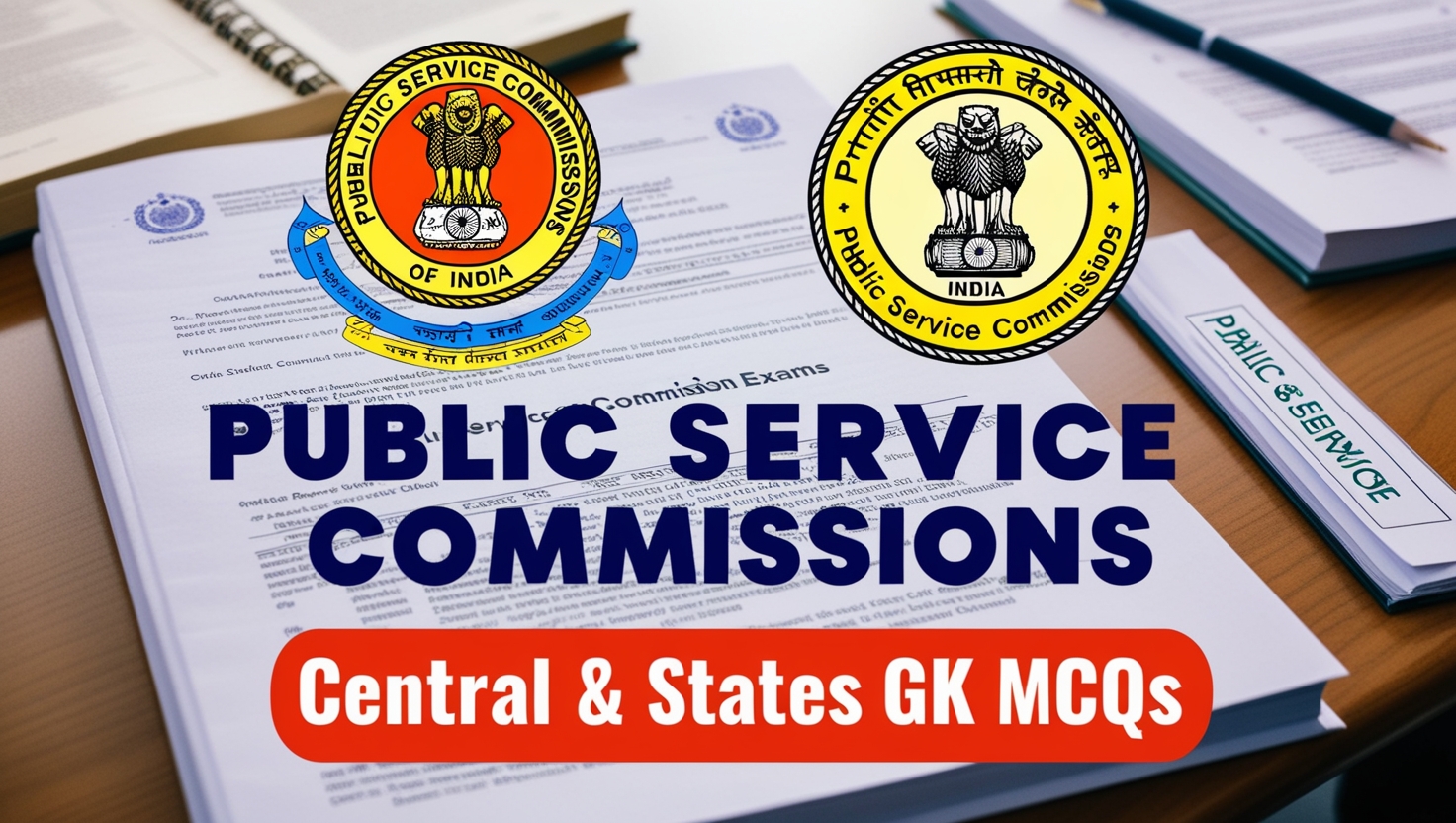
The article Public Service Commissions Central & States GK MCQs With Answer & Explanation in English provides an in-depth look at the key aspects of public service commissions in India. Covering both central and state commissions, this article offers important multiple-choice questions (MCQs) to enhance your general knowledge, along with detailed answers and explanations.
Ideal for competitive exam preparation, this comprehensive guide helps you understand the role, functions, and importance of public service commissions in the Indian governance system.
1. Which part of the Constitution contains elaborate provisions regarding the composition, appointment, and removal of members of the UPSC?
- Part XI
- Part XIV
- Part XVI
- Part XX
Show Answer
Answer: Part XIV
The Articles 315 to 323 in Part XIV of the Constitution of India contain detailed provisions regarding the composition, appointment, and removal of members, along with the independence, powers, and functions of the UPSC.
2. Who appoints the chairman of the UPSC?
- President
- Prime Minister
- Parliament
- Cabinet
Show Answer
Answer: President
The Union Public Service Commission (UPSC) is a constitutional body established under Articles 315 to 323 in Part XIV of the Indian Constitution. These articles contain detailed provisions regarding the composition, appointment, and removal of members, along with the independence, powers, and functions of the UPSC.
3. Who determines the conditions of service of the chairman and other members of the UPSC?
- Parliament
- Council of Ministers
- Prime Minister
- President
Show Answer
Answer: President
The President of India determines the conditions of service of the chairman and other members of the Union Public Service Commission (UPSC). Typically, the Commission consists of nine to eleven members, including the chairman.
4. What is the maximum age till which the UPSC chairman and members can hold office?
- 60
- 62
- 65
- 70
Show Answer
Answer: 65
The chairman and members of the Union Public Service Commission (UPSC) hold office for a term of six years or until they attain the age of 65 years, whichever is earlier. The President is authorised to determine their conditions of service.
5. To whom does the chairman of the Union Public Service Commission submit his resignation?
- Chief Justice of India
- President
- Vice-President
- Prime Minister
Show Answer
Answer: President
The chairman and members of the Union Public Service Commission can relinquish their offices at any time by addressing their resignation to the President. They can also be removed before the expiry of their term by the President as provided in the Constitution of India.
6. Who is authorised to exclude posts, services, and matters from the purview of the UPSC?
- Parliament
- Rajya Sabha
- President
- Council of Ministers
Show Answer
Answer: President
The President of India is authorised to exclude posts, services, and matters from the purview of the UPSC. The Constitution of India states that the President may make regulations specifying the matters in which it is not necessary to consult the UPSC regarding All-India services and Central services.
7. Which of the following is correct regarding the Union Public Service Commission?
1. It is the ‘watch-dog of the merit system’ in India.
2. It conducts recruitment to the All-India services and Central services – group A and group B.
3. It is involved in classification of services, pay and service conditions, cadre management & training.
Select the correct option from the codes given below:
- Only 1
- Only 1 & 2
- Only 3
- 1, 2 & 3
Show Answer
Answer: Only 1 & 2
The Union Public Service Commission is the ‘watch-dog of the merit system’ in India. It conducts recruitment to the All-India services and Central services – group A and group B. However, it is not involved in classification of services, pay and service conditions, cadre management & training. These matters are handled by the Department of Personnel and Training.
8. Which of the following statements are correct regarding the Union Public Service Commission?
- Its recommendations are binding in nature.
- Its recommendations are advisory in nature.
- It is a non-government organisation.
- None of the above
Show Answer
Answer: Its recommendations are advisory in nature.
The role of the Union Public Service Commission is limited, and its recommendations are of advisory nature, not binding on the government of India.
9. Which article contains provisions regarding removal and suspension of a member of a Public Service Commission?
- Article 317
- Article 318
- Article 319
- Article 320
Show Answer
Answer: Article 317
Article 317 of the Constitution of India contains provisions regarding the removal and suspension of a member of a Public Service Commission. Articles 315 to 323 in Part XIV of the Constitution contain elaborate provisions regarding the UPSC.
10. Which articles of the Constitution also deal with the composition, appointment, and removal of members, power and functions, and independence of a State Public Service Commission?
- Articles 315 to 323
- Articles 343 to 355
- Articles 365 to 378
- Articles 380 to 392
Show Answer
Answer: Articles 315 to 323
The same set of Articles 315 to 323 in Part XIV of the Constitution, which deal with the UPSC, also deal with the composition, appointment, and removal of members, power and functions, and independence of a State Public Service Commission (SPSC).








Leave a Reply